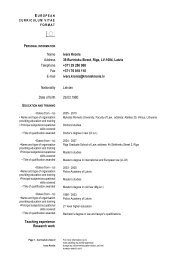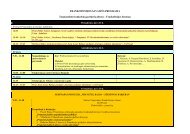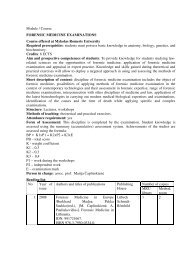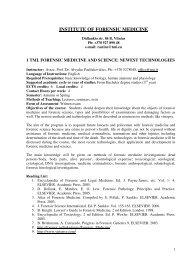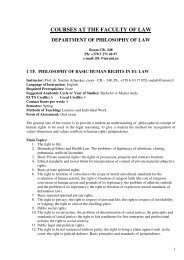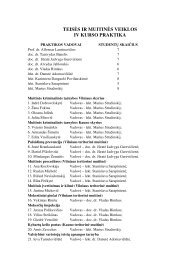Name of Lecturer: Prof. dr. Saulius Arlauskas tfk@mruni.lt
Name of Lecturer: Prof. dr. Saulius Arlauskas tfk@mruni.lt
Name of Lecturer: Prof. dr. Saulius Arlauskas tfk@mruni.lt
Create successful ePaper yourself
Turn your PDF publications into a flip-book with our unique Google optimized e-Paper software.
European Administrative Law<br />
<strong>Name</strong> <strong>of</strong> <strong>Lecturer</strong>: Lect. Ieva Deviatnikovaitė<br />
Facu<strong>lt</strong>y: Facu<strong>lt</strong>y <strong>of</strong> Law<br />
Department, Contact Details: Department <strong>of</strong> administrative law and procedure,<br />
IEVA<br />
Language <strong>of</strong> instruction: English<br />
Level <strong>of</strong> Course Unit: Bachelor<br />
Required prerequisites: None<br />
Learning Outcomes <strong>of</strong> the Course Unit 1 . A student will know/will be able:<br />
1. To demonstrate skills to crystallize features <strong>of</strong> administrative legal<br />
relationships;<br />
2. To demonstrate knowledge on public administration entities system in<br />
different European countries;<br />
3. To demonstrate knowledge on the EU public administration bodies’ system<br />
and their relationship with the national public entities;<br />
4. To identify administrative judicial system in the various European countries<br />
and to know European administrative procedure;<br />
5. Identify the perspectives <strong>of</strong> European administrative law<br />
ECTS credits: 6<br />
Contact hours per week: 3<br />
Semester: Autumn<br />
Planned Learning Activities and Teaching Methods: Lectures and seminars<br />
Assessment methods and Criteria: Examination<br />
Course content: (up to 10 sentences)<br />
The course will be based on the comparison <strong>of</strong> administrative law <strong>of</strong> various states<br />
(the UK, France, Central and Eastern European countries, and the USA). We will<br />
speak about one <strong>of</strong> the latest phenomenons – the European administrative law:<br />
leading principles; administrative powers in the EU – the European Council, the<br />
Council (<strong>of</strong> Ministers), the European Commission, Agencies; European administrative<br />
bodies’ interaction with the national public bodies; ECJ impact to the member states.<br />
The lectures are concentrated on the following topics: public interest; administrative<br />
law in general; system and functions <strong>of</strong> the executive institutions; system, structure,<br />
and activity spheres <strong>of</strong> the public administration institution; control and supervision <strong>of</strong><br />
the public administration institutions; public administration methods; public<br />
administration forms: administrative acts, administrative contracts, and administrative<br />
norms. Also students will be familiarized with the administrative justice system,<br />
Members states’ administrative courts’ systems, the jurisdiction <strong>of</strong> the administrative<br />
courts according to the nationality <strong>of</strong> the students, ECJ prejudicial decision.<br />
Topics can be tailored to suit individual learner’s needs.<br />
Reading list:<br />
1. Barnett, Hilaire. Constitutional & administrative law . Taylor & Francis<br />
group, 2006.<br />
2. Bailey, Stephen Henry Cases, materials and commentary on administrative<br />
law London : Sweet & Maxwell , 2005.<br />
3. Warren, Kenneth F. Administrative law. St. Paul (Minnesota): West<br />
Publishing, 1988<br />
1 Knowledge, skills, competences that students can demonstrate/acquires during the course<br />
24



